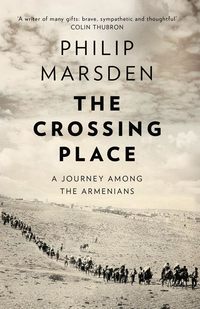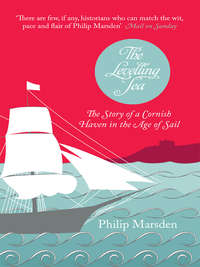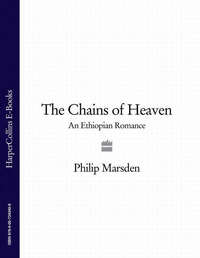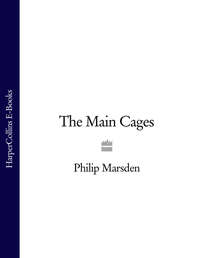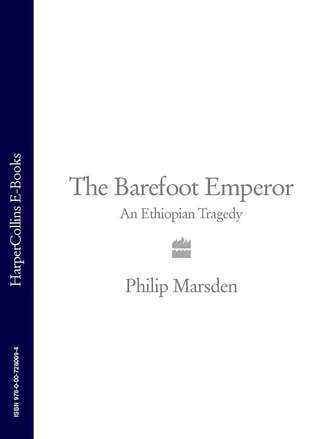
Полная версия
The Barefoot Emperor: An Ethiopian Tragedy
‘What did you have in mind?’ the mayor asked Richard.
‘Something bigger, about the size of a Volkswagen.’
So the mayor brought a small crane and they hoisted a V W Beetle on the back of a minibus, and they all agreed that that was much more like it. They multiplied the measurements and commissioned a metal-worker to forge it. A ramp was built, and the gun placed at the sort of angle at which it had rolled up to Zebit, or from the Jidda and Beshilo rivers, or for the final ascent of Meqdela itself.
The metal-worker also made a smaller model. Richard reached out and took it down from his mantelpiece. He handed it to me. I held it in my palm, a mini-Sevastopol to match the exaggerated one on Churchill Avenue. I marvelled once again at Tewodros’s gargantuan will, and at the strange distortions of scale that he had undergone since his death.
III
In 1863, Emperor Tewodros wrote in a letter to the French vice-consul: ‘Having heard reports from the time I was born until I reached maturity, being told over and over again that, by the power of God, there are in Europe, in the countries of the Europeans, those whose governments do not fall, who lack nothing in terms of law and order, in whom there is no deceit, by the power of God, I was very happy.’
From the start, contacts between Ethiopia and Europe were characterised by impossible expectations. Europeans came to the country with their own lofty ideas. They thought the emperor was an all-conquering Christian potentate (Prester John and his seventy vassal kings), or they wanted to locate the source of the Nile (a certain bog to the south of Lake Tana), or they came to hunt wild beasts, collect exotic flowers or correct the religious delusions of the country’s Christians. The Ethiopian emperors had their own hopes of the visitors. They wanted Christian solidarity, support in their wars, and technology – in short, they wanted guns.
The very first official visit from Europe set the pattern. One night in 1520 a small band of Portuguese arrived at the hedge outside the camp of Emperor Lebne Dengel with a letter of friendship for ‘Prester John’. The emperor refused to admit them. In frustration, a couple of the Portuguese raised their guns to the stars, and fired.
At once a messenger appeared: ‘His Majesty asks, how many guns do you have for him?’
‘We have three or four muskets and those for our own use.’
The emperor still refused to see them.
A few years earlier, the Ottoman Turks, under Sultan Selim the Grim, had conquered Egypt, received the keys of Mecca and with money and weapons spread their influence on down the Red Sea. They encouraged the emirates of the coast to annex Christian Ethiopia. Having no port, the Ethiopians found it hard to obtain arms to defend themselves. Now these Christian foreigners had come to see the emperor, and all they brought him was a useless letter.
In the end, Lebne Dengel did consent to see them and at once asked them ‘Do the Turks have good bombards?’
‘As good as ours,’ replied the ambassador. ‘We are not afraid of the Turks. We are valiant in the name of Jesus Christ.’
‘Who taught the Turks to make bombards?’
‘The Turks are men. They have skills and knowledge.’
And so it went on. The Portuguese ambassador wanted only to read out his letter from King Manuel I, and return home. But now he had admitted them, the emperor wouldn’t let them go (thereby establishing another pattern of the Ethiopian court – the detention of foreign visitors).
‘You have only just arrived,’ the emperor said. ‘You have seen only a fraction of my kingdom. Play your spinet for me. Dance.’ The ambassador danced.
A few days later Lebne Dengel asked for a musket demonstration. There were more requests, and as the days became weeks, the Portuguese grew uneasy. In the end it was six years before they were allowed to return to the coast. During that time the emperor gained from them just two swivel guns.
Three decades later in, 1557, the Turks finally occupied Massawa. Their plans to add Ethiopia to the Ottoman Empire were checked less by military means than by the Christians’ own natural defence, the highlands. For the next three hundred years, until the time of Tewodros, the Red Sea port of Massawa – Ethiopia’s gateway to the outside world – was governed by Muslims.
Meanwhile Spanish and Portuguese Jesuits had remained in Ethiopia, and early in the seventeenth century managed to persuade Emperor Susenyos to abandon fifteen hundred years of religious teaching, forsake the Christology of Alexandria and come over to Rome. Susenyos had underestimated the convictions of his subjects. The country collapsed into civil war. ‘How long,’ cried his people, ‘shall we thrust our swords into our own bowels?’ Susenyos abdicated and the Jesuits were expelled. There was great rejoicing: ‘At length the sheep of Ethiopia freed from the bad lions of the West!’ Disgust for Europeans was so intense that it drove the Ethiopians to arrange a treaty with the hated Muslims of Massawa: they agreed to prevent any European Christians from reaching the highlands. When the Ethiopian emperor received from the coast the stuffed heads of some French and Italian Capuchins, he knew he had found a reliable ally. Secure from both Turks and proselytising Christians, the Ethiopians remained isolated in the fortress of their mountains, free to pursue their own internal squabbles.
In 1798, Napoleon’s occupation of Egypt brought a new era of European power to the Middle East and introduced to Egypt the restless spirit of the Enlightenment. Twenty years later the Egyptian ruler, Muhammad Ali, pushed southwards down the Nile. For decades, pressing at the lowlands around Ethiopia, Egyptian forces made periodic forays into the mountains. Conquest by Egypt was the most persistent outside threat to Ethiopia during the nineteenth century.
The young Tewodros never forgot the encounter he had on the edge of the Sahara desert. In March 1848, as a warlord, he and his thousands of followers moved against the undermanned garrison at Dabarki. They were destroyed. The Egyptians had been well-drilled and well-armed. They also had two cannon. The guns turned Tewodros’s forces more effectively than 20,000 men and established in him a lifelong yearning for artillery.
At the same time, on the coast, France and Britain had shipped their perennial rivalry to the Red Sea. As Ottoman power declined and the port of Massawa grew sleepier, so the two European states found a new cause to fight over – access to India and the Far East. The existence of Christian Ethiopia just inland lured a new generation of European envoys and adventurers.
Two hundred years after the expulsion of the Jesuits, a young Englishman reached the highlands and conceived the idea of Anglo–Ethiopian contacts. It was the tentative start of a relationship that would stumble on through years of inertia, calamity and ignorance, grow stronger through expediency and expressions of mutual love, stumble again through bereavement, suspicion, muddle and imprisonment before entering the arena of its bloody dénouement, some twenty years later, amidst the dark basalt cliffs of Meqdela.
* Ethiopian time is measured from dawn: thus seven o’clock is one o’clock, midday and midnight are six o’clock.
I
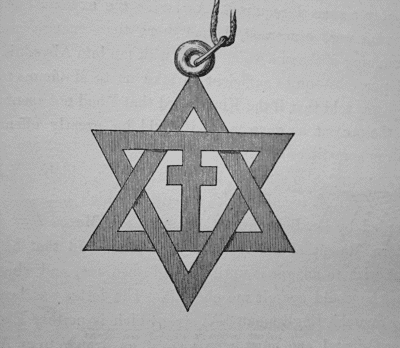
Tewodros’s Order of the Cross and Solomon’s Seal. From Hormuzd Rassam, Narrative of the British Mission to Theodore, King of Abyssinia (1869)
1
Walter Plowden lay on deck. It was April 1847. A warm wind filled the great lateen sail above his head; beneath him the dhow pitched to the short swells of the Red Sea. Far astern, to the south, he could see the distant rise of the Ethiopian highlands. Four years he’d spent there among its mountains, its roving courts, shifting from fief to fief, from battle to battle. He drew on his pipe, leaned back against the alga, and was filled with the reckless joy of parting.
‘Once more on the free waves,’ he wrote, ‘my heart beat lightly.’
Plowden was on a mission. He had persuaded Ethiopia’s ruler, Ras Ali, that there was one thing a modern state could not be without, and that was a trade treaty with Britain. Ras Ali himself couldn’t see the point. How would a trade treaty keep Dejazmach Wube to heel? Or the peoples of Wag and Lasta? What use was it against Biru Goshu, who had made off with his wife and who every year slaughtered the governors he appointed in Gojjam?
But all right, isshi, he would send an envoy with the young Englishman.
And here he was, the envoy, a poor highlander who had never before laid eyes on the sea, squatting in wide-eyed terror in Plowden’s cabin. With him were the gifts Ras Ali had selected for Queen Victoria – some rusting lances, a few bolts of homespun cotton and three very rare gazelle calves. The gazelles were also strangers to the sea. Plowden had bought them a nanny-goat for milk, and whenever they heard her bleating they would tug at their halters, squeak and whinny, and the deck would tip-tap with the sound of their delicate little hooves. Such was Ethiopia’s first embassy to Britain – a menagerie of the terrified, the untamed and the hopeful, despatched in indifference by a war-weakened ruler.
Plowden passed the days in impatient idleness. He lay on deck. He smoked his pipe. He drank beakers of coffee. Stretching his long limbs over the alga, he closed his eyes and felt the desert wind warm on his face.
Four years earlier, in his early twenties, he had been sailing the same waters. Then too he had been heading for England, fleeing India and a death-in-life job at Carr Tagore & Co. of Calcutta. But in Suez he met John Bell, a Scottish sailor as footloose and impulsive as himself. According to his brother, Plowden’s ‘ardent and ambitious temperament induced him, on the spur of the moment, without preparation and with limited funds, to join that gentleman in an expedition’. To Plowden, Ethiopia was rich with classical and biblical associations, a mountain enclave of Christianity in a Muslim region. Bell’s plan also had the whiff of antiquity around it – they would hunt the source of the Nile, whose annual flood had spawned the great civilisation of ancient Egypt.
The two set off overland and entered Ethiopia posing as elephant hunters. Within weeks they had been sucked into the country’s dramas. They forgot about the Nile. With each battle, each tented court, each chief who wooed them, they found the outside world receding. John Bell married a local woman and became a general in Ras Ali’s army. Neither he nor Plowden ever escaped the strange spell of the upland kingdom.
Plowden in particular found a fascination in Ethiopia’s medieval pageantry, in the ‘foppish’ self-love of the warrior caste, the ‘strain of feudal glamour’. For him Ethiopia’s antiquity, isolation and uniqueness were counters to the unsightly spread of modernity: ‘there is no parallel to it in this steaming and telegraphing world’. He grew to love the troubadour traditions of the quick-witted azmari, the recital of battle deeds in the doomfata; he learned to play the battle-polo of gugs, a game as deadly as any skirmish. With an ethnographer’s eye he began to record his observations, ‘Notes on Peculiar Customs’– ‘the Galla find the eating of fish disgusting, as do the Shoho … On waking, Christians utter a prayer to stop the devil entering their mouth … the shadow of a man who has slept with a woman the previous night is considered harmful …’ In Tigray he heard a host of proverbs convincing people that ‘relatives were of no use till after death’. He noted the prevalence of female circumcision among the peoples of the north.
During those early years he passed through the courts and camps of dozens of minor nobles, warlords and great regional chiefs. He rode with them, was captured by them, campaigned with them. He made many friends, and found himself offered horses, land and gifts. Some offered him their women ‘as one might offer the loan of a horse’. One ruler promised him his sister and two provinces. ‘For a moment I was tempted, having my full share (and a little more) of youthful folly, loving adventure, not being averse to war.’ But he moved on, to other valleys, other forested regions, other noble feuds.
War, he found, drove the ambition and passion of every Ethiopian highlander. War was a way of life, an end in itself. When the big rains finished in September, the month of Meskerem, and the rivers began to recede, the entire country stirred to the sound of the negarits, the recruiting drums. In tens of thousands, men then flocked to their shum, sitting astride his caparisoned mount in a thigh-length shirt of coloured silk, with a lion’s-mane cape over his shoulder.
Plowden’s enthusiasm for this world bubbles from every page of his writing. He was intrigued by its unseen codes and hierarchies. Followers outnumbered the fighting forces by as many as two to one. When Ras Ali moved to war, more than 150,000 people accompanied him. Eighty-eight drummers went before him, under a head drummer who enjoyed a host of enviable privileges because, if captured in battle, his life was never spared.
Apart from the soldiers (each possessing his own rank according to numbers of men killed) there were the keepers of the tent; the ‘mouth of the king’; the head of the advance guard; the chief of the night guards; the guard of the women’s quarters; the female providers of honey for the tej; the hundreds of tej-bearers, all women, with their own chief and their own hierarchy; the grass-cutters, wood-cutters, herdsmen, drummers and minstrels, butchers and maidservants. ‘So minute are the particulars of all these minor posts,’ Plowden wrote, ‘that they would fill a volume.’ When an ox was slaughtered in camp, he watched the meat being divided into a hundred pieces and distributed, each cut of the carcass corresponding to a different rank.
War was poetic and chivalric. Every year Ras Ali would march his tens of thousands to the province of Gojjam to do battle with its rogue ruler, Biru Goshu, who had taken the ras’s wife. Every year Biru would present Ras Ali with a cape to award to the governor the ras left behind. As soon as Ras Ali was gone, Biru killed the governor, took the cape and waited for Ras Ali to return again after the following rains. War was also brutal – the ‘warrior is bred to consider killing (geddai) as the great object of existence’. Musket stocks were hung with ‘disgusting trophies’, the leathery testicles of slaughtered enemies.
In good Victorian style, the young Plowden was both drawn to the wildness of Ethiopia and motivated by an urge to improve it. As the years passed, his enthusiasm began to veer away from the country’s medieval colour towards its worldly prospects. He wrote lovingly of a climate which could bear ‘comparison with any in the world’, a soil ‘fitted for every crop’, diversity of flora to amaze botanist and herbalist alike, green slopes for the tea-planter, gold, copper and saltpetre for prospectors. Ethiopia’s vineyards could challenge any in Bordeaux. It was India, on a smaller scale, but untouched. The country’s problem, Plowden said, was leadership. Calm and conciliatory diplomacy would unite its eternally squabbling chiefs, while those who resisted, who held out on the mountaintops, ‘would soon yield to the persuasion of some howitzers, or bombs of larger calibre’.
He puffed at his pipe, sipped his coffee, and shifted his legs on the alga’s leather grid. The breeze was good and the sails full. He was impatient to reach England, yet could not forget what he’d left behind. Sometimes during those languid days he thought he could ‘hear in fancy, the wild war-cry of the half-naked Galla … mingling with the murmur of the restless ocean’.
His mission soon ran into difficulty. The dhow’s captain proved to be an idiot. When the goat’s milk dried up, the first of the gazelles died. Another was killed leaping from a window in Jeddah, the third when the dhow was wrecked on a coral reef. Plowden alone struggled ashore from the wreck. For days he staggered through the Sinai desert, weakened by thirst, close to death, wondering whether ‘it were not better to die at once on my lance’. But after a week or so he reached Suez. There he found that the rest of the embassy had been rescued from the reef. All the presents had been lost or destroyed, and the envoy himself refused ever to go near a boat again. Plowden continued to London on his own.
2
A few weeks later, from a hotel room in Covent Garden, Walter Plowden wrote to the Foreign Office. He laid his plans before them in two detailed, handwritten reports. The Foreign Secretary at the time was Lord Palmerston, and by coincidence he had also been Foreign Secretary some fifteen years earlier when a similar letter was doing the rounds. That earlier letter came through a William Coffin, son of a yeoman farmer from Dorset who had been stuck in Ethiopia for so long he could barely speak English when he emerged. He had brought a letter of friendship from a Tigrayan noble to King George IV. The Foreign Office lost it. Coffin waited three years in London before they gave him the reply.
Plowden had more luck. This time Palmerston was immediately receptive. A foothold on the Red Sea was now of much more relevance, to protect the route to India from the French. He was convinced too of Plowden’s optimism about trade. Within a few weeks of landing in England (and after a little quiet investigation into the young man’s character), Plowden was appointed HM Consul to Massawa. He was to receive a salary of £500 a year, a gift budget for Ras Ali of £400, a letter signed by Queen Victoria herself and a nineteen-point treaty to lay before the ras.
Six months later, Plowden was back in Ethiopia. Thrilled to be among the mountains again, he took the road to Gondar. As it led higher into the Simiens, the air grew colder, the cliffs steeper, until at a high pass it pushed through a narrow doorway in the rock. With the great inland sea of Lake Tana on his right he entered land ruled by Ras Ali. Striding ahead of his baggage train, he reached the capital of Debre Tabor. There, outside the ras’s residence, he met his old friend John Bell. Pushing through the crowd, Plowden embraced ‘several old acquaintances’. In the semi-darkness of the court he found Ras Ali sitting on a cowhide on the ground, while workmen and courtiers, horses, flies and children milled around him.
‘He was much pleased to see me,’ wrote Plowden, ‘and immediately besieged me with questions as to what I had brought for him.’
After the initial meeting, Plowden retired. Several times that first day, messages arrived from the ras. Let me see the gifts. Have you brought guns?
Plowden gave no answer.
The next day he again entered the ras’s court, and read out the letter from Queen Victoria:
‘Your Highness will clearly perceive the great advantage to Abyssinia from intimate connection with the Sovereign of the British Empire whose dominions extend from the rising to the setting sun –’
Ras Ali looked up at the long-legged Plowden: Why does the farenj stand?
‘– and whose fleets are to be met with in every part of the seas which encompass the earth.’
Ras Ali knew nothing of the sea.
Plowden then spread the bulk of the gifts before him. The afe-negus – ‘mouth of the king’– whispered to Plowden, ‘One thing at a time is usually better.’
Plowden waved him away. His queen, he told him, did not mind. He gave a flamboyant bow, left the gifts, and stepped out again into the sunlight. Plowden was no longer the eager young traveller who had left the ras two years earlier. He was now Her Britannic Majesty’s Consul and he was playing the ras. As the days passed Ras Ali began to send requests to Plowden for more gifts.
‘It is needless to recall,’ boasted the consul, ‘all the childish messages with which I was bored every five minutes.’ With the ras primed, Plowden then subtly introduced the idea of signing the treaty.
But Ras Ali was also playing Plowden. At each meeting, Plowden was forced again to go back to the beginning. What exactly is this treaty? What use is it to me? And each time Plowden had to explain that it offered friendship between sovereigns, and that his own sovereign whose fleets etc. Each time, Plowden had to part with a gift. He began to dig into his own supplies. First the matchlocks brought from Egypt. Then his own private armoury, the guns and pistols kept for his protection. And still Ras Ali put off signing the treaty.
Then Plowden heard a familiar sound. From the tented city, from the plains around Debre Tabor came the beating of the ras’s negarits. Tens of thousands of souls stirred, packed up their tents, rounded up their sheep and cattle. The chiefs took down their slash-sleeved shirts, men left their homes to join the southbound flood. The ras was going to war. He was leaving for his annual fight with Biru Goshu. Plowden had no option but to take his treaty and follow him.
They dropped down into the gorge of the Blue Nile, and crossed into Gojjam, the land of Biru Goshu. In time the campaign reached the stage it always reached. Biru sat safe in his mountain stronghold, Ali was camped below. The rains came, the ground turned to mud. The rains ended and then Ras Ali’s hordes began to pack up and leave.
It was at that moment that Ras Ali summoned Consul Plowden. He was ready to sign the treaty.
Ras Ali was on a divan in his tent discussing a horse with one of his men. The horse stood beside them. His scribe began to read out the Amharic text.
‘There shall be a firm, mutually cordial and lasting friendship between the king of Abyssinia and Victoria, the queen of England …’
Ras Ali continued talking about the horse.
‘Please, master – listen!’
He nodded.
‘The king of Abyssinia shall receive and protect the envoys or consuls of the queen of England … Likewise the queen of England shall receive and protect the envoys or officials of Abyssinia …’
When all nineteen clauses had been heard, everyone looked to the ras. The ras looked up at the horse, admiring its sleek sides and strong legs.
‘I see no harm in this treaty, but it seems useless. The country as it is now is of no use to merchants. No English merchant will be able to reach it for ten years or more.’
But he signed. Plowden prepared to leave for the coast.
Ras Ali would not let him go. He told Plowden to give him his best rifle. Plowden refused. The days passed. His food ran low, his patience thin, and like the Portuguese delegation so many years before, the British envoy had the growing sense that he was a prisoner in these remote highlands. He gave in. He handed the ras his best rifle and left for Massawa. There he would wait for peace to spread through the troubled kingdom so that he could attract traders and artisans, and prove Ras Ali wrong.
3
Ethiopia’s Christians suffered not only from the endless round of civil war, but from the collective grief of former glory. In their eyes, Ras Ali was a usurper. He was an Oromo, and the Oromo did not share the same blessings as themselves, the high destiny bestowed on them, centuries earlier, by God. The Oromo were a pastoralist people, mainly Muslim, who had pushed up into the central highlands in the eighteenth century. They proved fearless in battle and were used as warriors first by the emperors’ rivals against the emperor, then by the emperor himself against his rivals. As the Christian regime weakened, the Oromo grew more powerful. In 1803, Ras Gugsa – grandfather of Ras Ali – became the country’s ruler, and converted from Islam to the Christianity of most of his subjects (though they all knew that really a hyena cannot become a goat).


